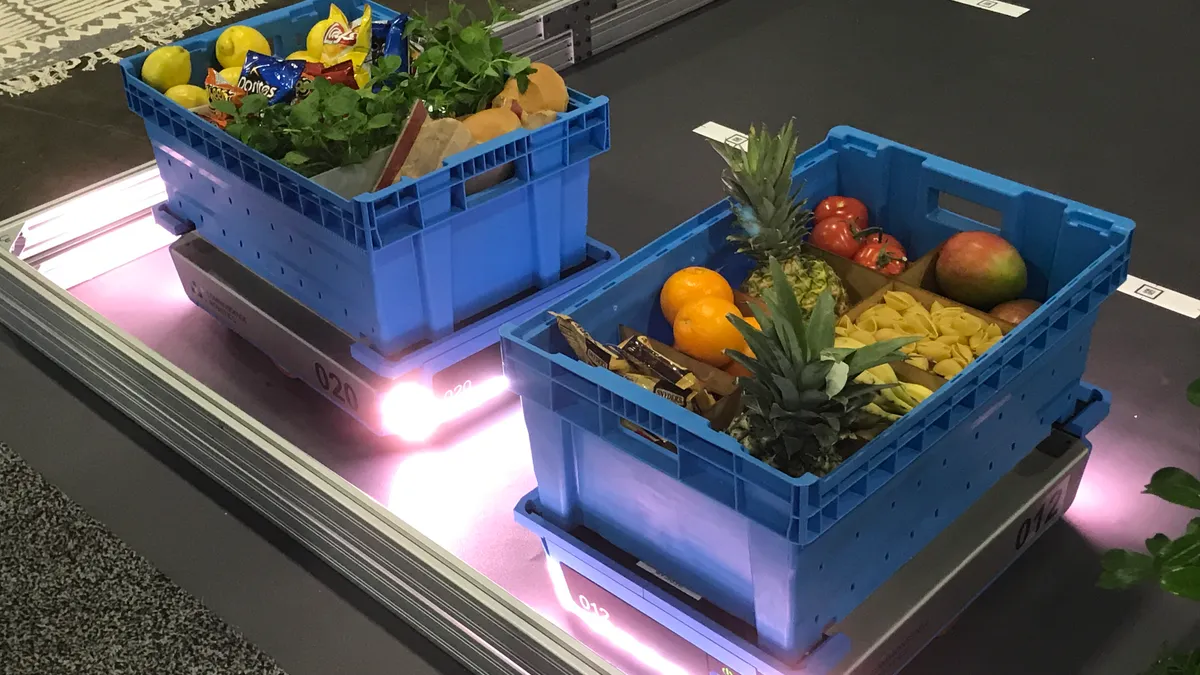Dive Brief:
- As grocers like Kroger, Stop & Shop and Walmart adopt automated fulfillment solutions for e-commerce, Israeli technology firm CommonSense Robotics told Grocery Dive it plans to partner with five leading U.S. grocers in 2019 and 2020 to build automated micro-fulfillment centers that will prepare online orders for delivery in less than an hour.
- CommonSense recently signed a deal with Israeli discount grocer Rami Levy to build 12 fulfillment sites that will each service multiple stores. The company said its U.S. partnerships will be roughly the same size and centered on the East Coast and Midwest. Each site takes six months to build and begin operating.
- The company also announced the opening of a 6,000-square-foot micro fulfillment center in Tel Aviv, Israel. The site, which fills online orders for Super Pharm pharmacy stores (a sister chain to Canada’s Shoppers Drug Mart) is the world's smallest automated e-commerce facility, according to CommonSense.
Dive Insight:
Like fellow automation companies Alert Innovations and Takeoff Technologies, CommonSense Robotics offers what could very well be the future of online grocery fulfillment.
The company aims to build tiny warehouses that can fit into city centers and other densely populated areas in the U.S. Inside each site, a small army of robots will zoom around stocking and unstocking products for delivery. Human workers will be on-site, too, but they will do a minimal amount of work — mainly, unboxing inbound products and then packing up the final orders that go out to consumers. According to Ran Peled, CommonSense’s head of marketing, robots handle 95% of the labor and control 99% of the movement of each product.
Although CommonSense plans to partner with individual grocers, its sites, like those being built by competitor Takeoff Technologies, are meant to fulfill orders for multiple grocers at a time, thus maximizing capacity. There's a lot of flexibility as to where CommonSense can build, Peled says. It has leased space, for instance, in the basement of Tel Aviv’s Shalom Tower, Israel's first skyscraper. While the company's engineers begrudgingly call it "the cave," the site is cost-effective and located right in the city’s center.
Whereas CommonSense’s 6,000-square-foot prototype in Tel Aviv fills nonfood orders — a less complex undertaking meant to test and hone its technology — its future sites will be larger, contain three temperature zones and be able to handle the full assortment of grocery products. The company takes a per-item fee from grocers and can offer customer pickup from its site or from grocery stores. Peled, however, says the tech firm is betting on home delivery as the preferred method for consumers as prices come down and quality goes up.
"We want to build our networks to offer 100% home delivery that is free and within one hour," he told Grocery Dive, noting that CommonSense doesn't handle delivery itself, but can interface with retailers or a third-party service like Uber.
As consumer interest and competition in online grocery heats up, automated fulfillment is gaining traction with retailers as an ostensibly faster, cheaper alternative to the store-focused, manual picking operations that most companies currently rely on. In addition to Kroger's landmark deal with Ocado and Walmart's one-store pilot in New Hampshire, Sedano's recently began sourcing online orders from a micro-fulfillment center built by Takeoff Technologies.
Meanwhile, Stop & Shop plans to open a fulfillment center in partnership with Takeoff early next year. The location, which is 80% complete, will service some of the chain’s newly updated stores in Connecticut.
"More than anything else, it's going to help us with speed," Stop & Shop president Mark McGowan told Grocery Dive in an interview. "It’s going to get our timing as close to consumer expectations as possible."
Automated fulfillment firms like CommonSense promise to bring down fulfillment costs for grocers, which should allow them to lower one of the biggest barriers to online grocery: delivery fees. This could accelerate consumer demand for e-grocery, especially if these automation firms can keep quality and execution levels high.
Automation isn't just happening in online fulfillment. Retailers are bringing robots into their aisles to check inventory and scan for out-of-stocks. Grocers are also relying on automation in their distribution centers and in their stocking operations. As retailers’ bottom lines continue to come under pressure, look for increased automation across all parts of the store.













